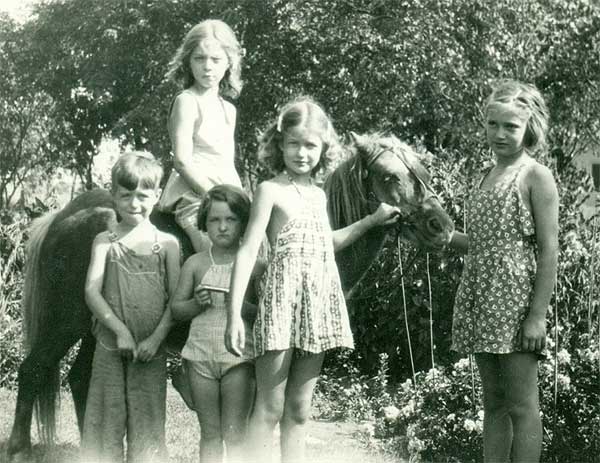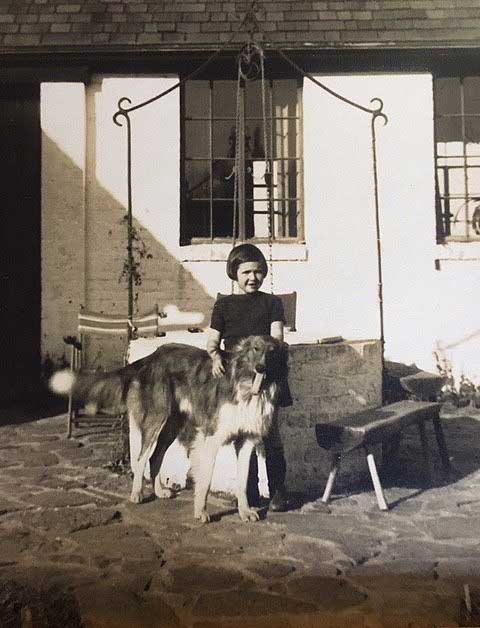A Word Picture of Hilltop Camps
by Joy Pratt Markham (1938) - Part 4 of 4
|
Community Radio show aired on KPSQ 97.3 FM: |
Ballroom and folk dancing are taught to those who wish these lessons. Often the older boys and girls will dance together in the evenings after supper, and on weekends we may combine a dance with a costume party. Sometimes talented dancers give a recital for the rest of the camp.
There are two practice pianos on which campers may keep up their piano practice at camp. If the parent wishes it, a leader is assigned them during the practice period. Piano lessons may be taken at a moderate extra charge. French and Spanish lessons under excellent teachers may also be had. We are fortunate in being near a University town where the best of teachers can be obtained. Occasionally we have a talented girl or boy who wishes to study drawing and painting during the summer. Mrs. Markham, whose work was first as a painter and who had the privilege of studying with George Bellows, brings suitable teachers for these to Hilltop upon request. The campers learn to sing their camp songs and many other beautiful songs together at camp. In summers when a sufficient number of campers playing orchestral instruments are enrolled, an orchestra leader is included on the staff.
Planning for our campers individually, providing for their needs spiritually and mentally as well as physically, as the summer camp has such an exceptional opportunity to do, leaders are chosen at Hilltop who furnish the best examples in character and mind to our campers. At camp, the best in the boy or girl appears. If there is someone there to encourage it, this steps farther out, to greet the sunshine, and the individual expands.

1938 photo of siblings Marion (Orton), Joanne (Stewart), and Tom Rogers with two friends and their pony.
To show what children looked like in 1938. Not taken on Markham Hill. From the Orton family archives.
Putting the child into the out of doors is like placing him in a wonderful library. All knowledge is there and is his when he has the eyes to see, ears to hear, and knows how to look beneath the covers and search through the pages. Developing the seeing eye and the hearing ear is like learning to read. Having a wise companion is like having someone to direct us to the books which are most helpful to us along the paths of our progress. At camp we find “books in running brooks, sermons in stones, and good in everything”.
Campers who are overweight or underweight receive the same careful attention that is given to each individual, with exercise, rest, and food rightly apportioned. Campers [who are underweight] begin to put on weight and often make surprising growth in stature after the opening weeks of camp. Campers who are overweight begin to be more active and gain at camp a start in habits of eating and living that have always resulted in a trim, hardy form following not long after their first summer at camp. With excellent physicians and nurses available within ten minutes in Fayetteville, there is no necessity for a resident physician or nurse at camp. Our health measures are those of constant, watchful care. Parents are kept informed of the exact physical condition of the boy or girl at camp.
Every attention is given to sanitary conditions in the dining hall and kitchen. Garbage is carefully disposed of. The dining room is kept free of flies. The best of water and milk is served with our meals, with hot chocolate at breakfast on cool mornings. Coffee or tea are not served. Our meals are prepared from the best of ingredients by an excellent southern cook, assisted by another who bakes our bread at the Big House. Camp time is fruit time in the Ozarks. Beginning in June with red raspberries and cherries, the successive weeks bring their gifts of blackberries, dew berries, plums, summer apples, and peaches, until they culminate in August with a munificence of home-grown watermelons, cantaloupe, and luscious grapes of many colors. Southern biscuits and blueberry muffins, fried chicken, and ice cream two or more times a week are items of our meals. Our leaders do not smoke.
Hilltop campers are of various religious denominations. Mrs. Markham is a Christian Scientist. The boys and girls who are Scientists are given from twenty minutes to an hour each weekday, according to their ages, in which to study their weekly lesson, which they do with Mrs. Markham or a leader who is a Scientist. Other campers whose parents wish them to study their Sunday School lessons daily are given this opportunity, with a leader to help them, if this is desired.
The camp tuition fee for the season of 1938 is again at the new low rate of $190.00 for the season of eight weeks. Horseback riding is included within this fee. If riding is not desired, twenty-five dollars is deducted from the fee. If more than three rides a week (and in the horse show on Sundays) are desired, these may be had at a proportionate extra charge. The camp fee covers all but special music, French, Spanish, or art lessons, tutoring, and laundry. Ten dollars should be sufficient to cover laundry expense for the season.

1936 photo of Joy Pratt Markham’s niece Evangeline Waterman, at her home on
Markham Hill, what we now call Evangeline’s Cottage. The child died suddenly
from polio in the summer of 1937. Mrs. Markham sent all the camp children home.
Fifteen dollars is deposited with the camp for the personal expenses of the camper, which are incurred for Kodak supplies, materials used in the workshops, haircuts, and occasional picture show, etc., in addition to twenty-five cents each week to the younger campers and fifty cents a week to the older campers for spending money. The campers are instructed in the use of check books which provide an accounting of how their money is spent. Parents are requested not to allow the camper more than the allotted fifteen dollars unless the camp asks for it.
Khaki or tan shorts and shirts or blouses with bitter-sweet tie for the girls and “Hilltop blue” tie for the boys, with brown sweater and socks are the basis of our camp uniform. There is one white outfit for Sundays. A list of required clothes and other equipment is sent to each enrolled camper as soon as the enrollment is received. Every provision is made to help the campers to care for their belongings, but the camp cannot be held responsible for loss from any cause.
Applications for apprentice leaderships are gladly received and are given careful consideration. Tuition for apprentice leaders is $145.00, with horseback riding, for the camp season.
The camp season of 1938 is from June ninth to August fourth. Campers are accepted by the week during August or for the August season of four weeks.
Our summer temperature calls usually for two woolen blankets at night, and in the middle of the day is fine for a swim. It is rare that one blanket is not used, and occasionally the three woolen blankets which the camper brings are required. The water in our pool is cool, not cold.
Hilltop is within three hours’ motoring distance over paved roads from Tulsa, Oklahoma, and six hours from Oklahoma City, Little Rock, and Kansas City. St. Louis, Memphis, and Dallas are about an equal three hundred and fifty miles’ distance to the northeast, southeast, and southwest, respectively.
New campers are admitted upon interview with a Hilltop representative or upon satisfactory recommendation. Correspondence is welcomed by Mrs. Markham and by the representatives, patrons, and leaders whose full names and addresses are given below. ...